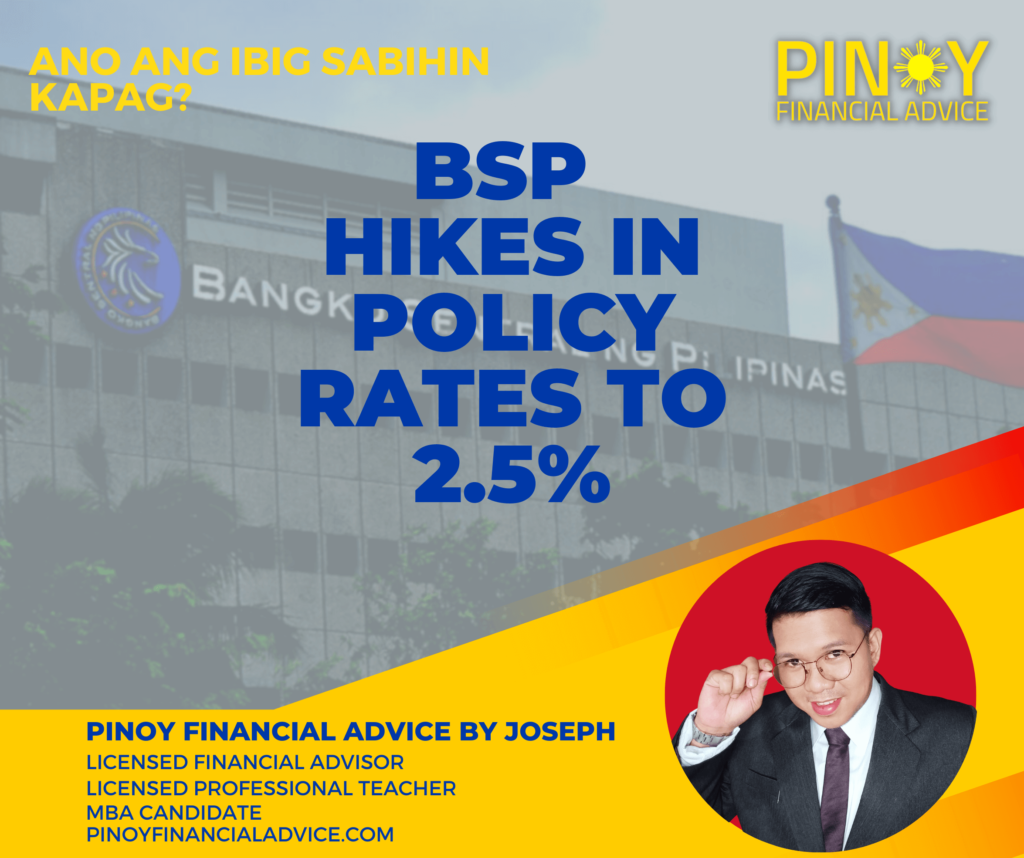BANKO SENTRAL NG PILIPINAS HIKES IN POLICY RATES TO 2.5% - Ano Nga Ba Ang Kahulugan Nito Para Sa Isang Ordinaryong Mamamayan?
Kapag tumaas ang interest rate ng Banko Sentral ng Pilipinas, ano nga ba implikasyon nito at epekto sa atin bilang ordinaryong Pilipino? Maaaring sa isang manggagawa o professional man, ito ay walang epekto at di nakakabahala.
Isang post sa social media ang nakita ko at talagang very relevant sa mga kaganapan ngayon lalo na ang pagtaas ng presyo ng mga bilihin at koneksyon nito sa pagtaas ng policy rates or interest rates ng Banko Sentral ng Pilipinas.
Ang tanong sa isang comment ay kung ano ang ibig sabihin nito in layman’s terms.
Dahil isa sa layunin ng blog na ito ay maibahagi ang kaalaman lalo na sa financial literacy para malaman ng isang ordinaryong Pilipino ang kahalagan ng mga kaganapan pag dating sa usapang pera at kasali dito ang Banko Sentral ng Pilipinas na ahensya na nagreregulate ng pera na nagccirculate sa isang financial market at ekonomiya ng ating bansa. At kasali tayo dito bilang mga mamimili.
Kapag tinaasan ang interest rates ibig sabihin nililimita ng BSP ang pagcirculate ng pera upang macontrol at bumaba ang inflation rate na nangyayari sa kasalukuyan.
Sa ordinaryong sitwasyon, ibig sabihin nito kapag kulang ang pera sa isang financial market, hindi lahat makakabili ng gusto nilang bilihin.
Kapag maraming produkto resulta ng pagbaba ng demand dahil kulang ang pera na nagccirculate, pwedeng hindi kaagad tumaas ang inflation rate o ang pagmahal ng mga presyo ng bilihin.
Ito ay may koneksyon sa Law of Supply and Demand – kapag maraming supply kulang ang demand, pwedeng bumaba ang presyo. O kapag kulang ang supply, marami ang demand, pwedeng tumaas ang presyo ng isang produkto.
Sa di ko inaasahan may natuwa sa comment ko, at may nag follow-up question. Ang tanong ay: is this good way to lessen impact of inflation?
The answer is based on the basic role of the BSP, and basically and economically speaking, yes this is a good way and the best way.
There are other ways to lower the inflation. On economic perspective, ang pwedeng gawin ay pataasin ang production basically from the raw materials level as part of increasing supply. Pero sa ganitong situation if affected ang supply due to increase in prices of raw materials (kagaya ng labor, oil, grains, and other materials involved) ang isang malaking way is to control the interest rates kagaya ng ginagawa ngayon ng BSP. And another way is the intervention ng gobyerno to subsidize as support to the producers not to increase their cost thereby not to increase their prices.
Pero sa isang ordinaryong tao, para di tayo maapektuhan masyado ibig sabihin nito ng pagtaas ng inflation rate eto ang basic na magandang gawin:
- The more income, the better (not to rely on one source of income)
Mas maganda kapag meron pa pagkukunan ng income. Maaaring investment sa business or isa pang part-time job. Maari ring magdiversify ng income sa paraang meron passive income kagaya ng No. 2. - Invest in a financial instrument and other forms of investments (eg: bonds, stocks, mp2, real estate, insurance, etc,) kung ano ang kaya, na hihigit pa ang earnings sa given current inflation rate kasi…. if ang earnings ng isang investment ay 4% and the inflation rate is 5.8% then ibig sabihin we are 1.8% poorer or kulang pa ang kinita natin para makasabay sa posibleng pag akyat ng mga presyo ng bilihin.
- Invest in learning new skills. Hindi madali ang kumita agad ng walang tamang kaalaman. Mas maganda at ideal mag karoon ng income sa isang bagay na alam mo kung paano gawin. Sa mga investment kagaya ng No. 2. maraming mga company at isa ang mga financial advisors sa nagbibigay ng tips kung ano ang mga nababagay sainyong investments ayon sa capacity o kakayanan mo at risk-tolerance.
Dapat natin maunawan na itong content ay based lang sa interest rate at epekto nito sa inflation rate.
Source: Banko Sentral ng Pilipinas
Financial Advisors are required to undergo training and seminars in order get license from a regulatory body so that they can practice their profession and provide financial advice. In the Philippines, the regulatory body is the Insurance Commission. This regulatory body was built when the Insurance Act 2427 was enacted by the Philippine Legislature in 1914, although the regulatory by that time was called Insurance Division of the Bureau of Treasury. Nevertheless, it was not until December 1874 when the Office of the Insurance Commissioner was renamed as the Insurance Commission.
The Insurance Commission regulates the actions of Insurance Companies and Financial Advisors in the Philippines. They ensure that all insurance policies be it for Health Protection, Education, Income Continuation, and/or Retirement are fair and reasonable. They ensure that all Financial Advisors in Bicol and the rest of the country strictly adhere to ethical and moral standards, thereby ensuring that Filipinos get the most suitable insurance policies.
Information Source: SunLife.com.ph
#financialfreedom #financialeducation #financialliteracy #wealthmanagement #financialplanning #financialconsultant #pinoyfinancialadvice #SunLife #BSP #BangkoSentralngPilipinas

FREE Financial Planning
Get FREE Financial Planning from a Licensed Financial Advisor in Bicol
Pinoy Financial Advice provides FREE Financial Planning Services. Contact us via mobile phone or send us an email to schedule an appointment with our friendly, Licensed Financial Advisor. What’s even better is that our Financial Advisor will meet you in the most convenient way.
Schedule your appointment and choose whether to conduct your meeting via Zoom or FaceBook; or meet our Financial Advisor at a local place like a Coffee Shop. Please take note, however, that as of the moment, we only do Face to Face meeting within Naga City, Camarines Sur.
Hurry and contact us now to start planning a brighter future for you and your loved ones!
Need FREE Financial Advice?
Do you need advice about your finances? Are you having problems tracking where your hard-earned money goes to? If so, contact us today and we will do our best to help for FREE!
